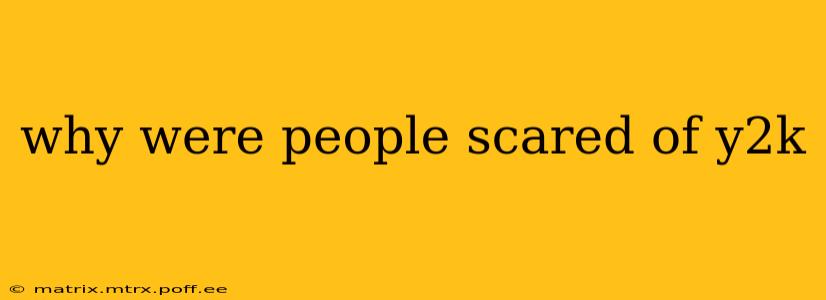Why Were People Scared of Y2K? The Millennium Bug and the Dawn of a New Era
The year 1999 saw a palpable sense of unease sweep across the globe. It wasn't a looming war or natural disaster; the fear was far more abstract—the potential for widespread technological collapse due to the Y2K bug. But why were people so scared? The answer lies in a combination of genuine technological vulnerabilities, widespread media hype, and a healthy dose of millennial anxiety.
The core issue stemmed from a simple, yet incredibly pervasive, programming shortcut. Early computer systems, constrained by limited memory, often stored dates using only two digits for the year (e.g., 99 for 1999). As the year 2000 approached, these systems faced the possibility of misinterpreting "00" as 1900, leading to a cascade of potential failures. This wasn't just a minor inconvenience; it threatened to disrupt critical infrastructure systems worldwide.
What exactly was at risk during the Y2K scare?
The potential consequences of Y2K were truly frightening. Imagine a world where:
- Financial systems grind to a halt: Banking transactions, stock markets, and payroll systems could all fail, leading to financial chaos.
- Power grids collapse: The failure of automated systems controlling power generation and distribution could plunge entire regions into darkness.
- Communication networks crumble: Phone lines, internet connectivity, and emergency services could be severely disrupted, hindering communication and response to crises.
- Transportation systems falter: Air traffic control, railway networks, and even simple traffic lights could malfunction, causing widespread disruption and potential accidents.
- Medical equipment malfunctions: Hospitals relied on computerized systems for essential functions, and a Y2K failure could have jeopardized patient care.
These were not mere theoretical possibilities. Many older systems, particularly those in less technologically advanced countries, were known to be vulnerable.
What were the most common concerns leading up to Y2K?
The anxiety surrounding Y2K wasn't just about the technical details. Several key factors fueled public fear:
- Media Hype: News reports often exaggerated the potential consequences, playing up the worst-case scenarios and contributing to a climate of fear and uncertainty. This sensationalism, while designed to grab attention, undoubtedly exacerbated anxieties.
- Lack of Transparency: The extent of Y2K vulnerability wasn't fully known. Many companies were reluctant to disclose the true state of their systems, further fueling speculation and fear.
- Global Interdependence: The interconnected nature of global systems meant that a failure in one area could trigger a domino effect, affecting multiple countries and sectors.
- Millennial Anxiety: The turn of the millennium itself carried a symbolic weight. The year 2000 represented a new era, and the possibility of technological failure added to the pre-existing anxieties about the future.
How did people prepare for Y2K?
Facing potential chaos, many individuals and organizations took precautions:
- Businesses invested heavily: Significant resources were poured into Y2K remediation efforts, updating software and hardware to mitigate the risks.
- Individuals stockpiled supplies: Some people stocked up on food, water, and other essentials, fearing widespread disruption.
- Governments established task forces: Numerous governments formed task forces to coordinate Y2K preparedness and response efforts.
Was the Y2K scare justified?
Ultimately, the Y2K scare proved to be a bit overblown. While there were some minor disruptions, the catastrophic predictions largely failed to materialize. The widespread remediation efforts undertaken in the preceding years were largely successful in preventing a global technological meltdown. However, the Y2K bug served as a valuable lesson about the importance of robust software development practices, risk management, and the potential consequences of neglecting long-term technological vulnerabilities. It highlighted our reliance on technology and its inherent fragility. The experience also underscores the powerful influence of media coverage in shaping public perception and anxieties.
